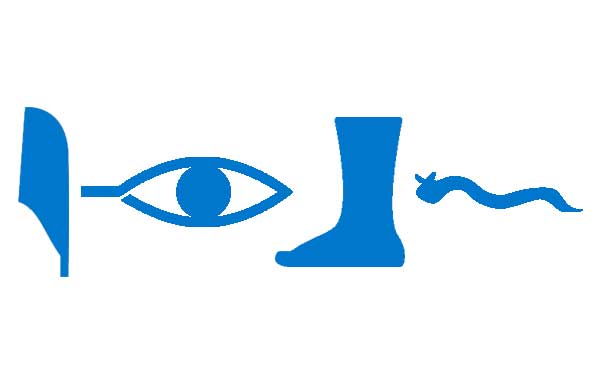Reading and writing is so much more than spelling!

Over the Christmas holidays, during the flurry of parcels being delivered to my house, I received a parcel that I had not ordered myself that had been sent to the wrong address. This parcel contained a book; ‘Egyptian Hieroglyphs for Complete Beginners’. Initially I wondered about the type of person that this would be a Christmas present for and whether they had received the book that I had ordered, The Jolly Christmas postman! I secretly hope that they did!
Reading the preface, the purpose of the book is to give you the confidence to read hieroglyphics, so I ended up sitting down over the holiday and seeing what I could learn. I thought that it would be a great opportunity to learn something new, I really enjoy languages and surely this would be like learning to read and write in a secret code! Plus, there wasn’t really very much else to do over the holiday as a result of the restrictions in place.
Unfortunately, and probably more obviously to other people, it was not so simple! Learning to read hieroglyphics involves needing to understanding Egyptian language, which I do not. Yes, I could learn that an owl symbol represents the sound ‘m’ and a hand represents the sound ‘d’. I could even start to recognise symbols written together (you can write them left to right, right to left or top to bottom in Egyptian) and could blend or say these sounds together. But I don’t know what the words I am reading mean. Without understanding Egyptian words, I can’t read hieroglyphics and without speaking Egyptian, I can’t write in hieroglyphics.
This instantly put me in the shoes of so many children with speech and language difficulties who struggle to learn to read and write, because of their difficulties understanding and using words. In the same way as when I tried to read hieroglyphics, we can teach a child to listen to and recognise different sounds and then to write the sounds as letters. They may be able to sound out words and say them clearly when reading, but if they don’t understand what words mean, they will be unable to understand anything that they are reading.
This is because children need to develop a good understanding of spoken words and ability to use words, before they will be able to develop their literacy skills. As a result, many children with speech and language difficulties struggle to learn to read and write. Unfortunately, most of the tasks that they need to do in school, especially after Reception year, involve reading and/or writing. This affects the progress that children with speech and language difficulties are able to make and can mean that they are reluctant to complete these tasks.
For parents supporting children at home during the current lockdown, this reluctance can transfer to home, and you can find that your child may be reluctant, or even completely refuse, to complete tasks that involve reading and writing. Whilst it is important that they have some time to practise reading and writing, you can actually support the development of their literacy skills by instead focusing on developing their speaking and listening skills.
Choose some work tasks each day and take away the need for your child to read and/or write. If the task is for your child to read a piece of text and then answer some questions about it, you can read the information out loud for them and they can then answer the questions. If the task is for them to pull out key information from a web page, you can read the information for them, encouraging them to listen out for, and record, the key information they need. Your child is still completing the task that has been asked of them; answering questions about a paragraph or pulling out key information about a topic.
In the same way, for tasks that involve writing, you can scribe for your child and write down what they want to say. This way your child can focus on what they want to say, putting their words together into a sentence and remembering that sentence, rather than having to also think about spelling and physically writing it down as well.
It can feel as though by removing some of the times that your child needs to read and write that you are not supporting them to develop these skills. In fact, the opposite is true. The better able children are to understand words when they are spoken and to pull out key information from spoken information, the better they will be able to do this when they are reading. The more practice they have of putting words together to create sentences and expressing themselves using their spoken language, the better able they will be able to do this when writing. If your child has speech and language difficulties, they are likely to be much more motivated to complete these tasks, and better able to complete the reduced number of tasks that do require them to read and write, because there is a better mix of different activities – and not all of the activities are asking them to do something that they find extremely difficult.
Try it yourself and develop your child’s speaking and listening skills at home, which will help to boost their literacy skills.